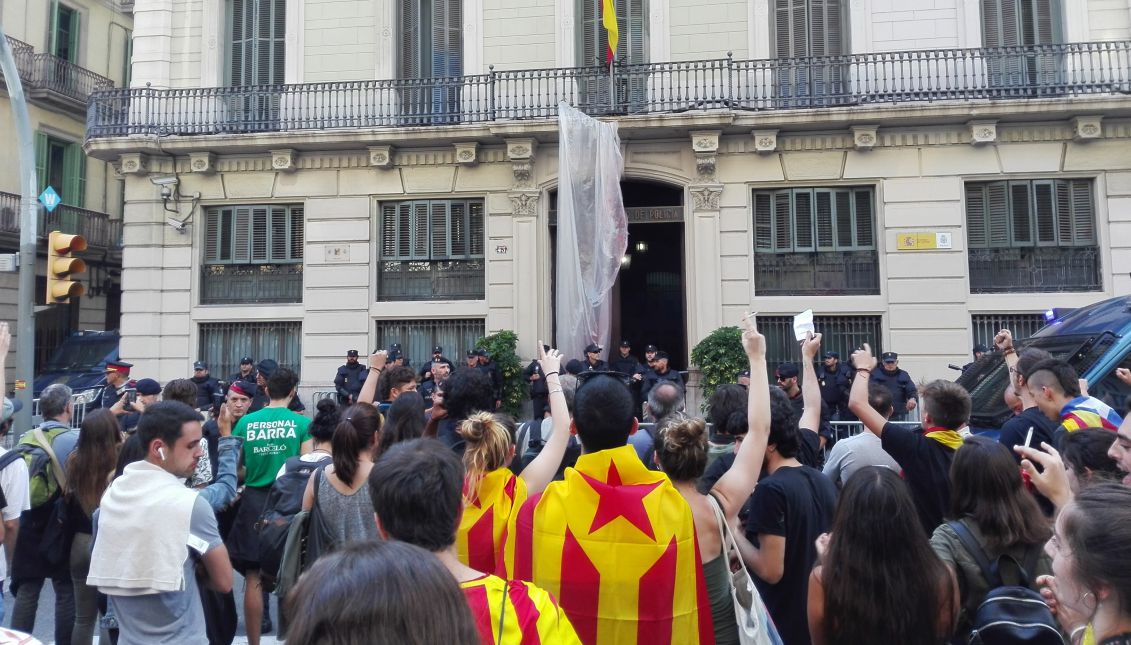
Catalunya - Spain: the Independence Referendum’s bitter hangover
After the scenes of police violence experienced on Sunday - when the country celebrated a referendum for independence that Madrid considers illegal – the…
The Catalan society woke up on Monday with images of the excessive violence perpetrated by the Spanish police against the peaceful citizens who tried to vote on Sunday in a referendum of independence considered "illegal." More than 800 people were injured under the police charge ordered by the central government, controlled by the conservative Popular Party. The Catalan government considers the result of the valid referendum and proposes to unilaterally declare their independence.
On Sunday at eight o'clock in the evening, the closing hours of the polling stations, dozens of citizens gathered outside the doors of La Concepció de Barcelona school and began to sing in unison with great enthusiasm: "Hem votat, hem votat" (“we voted”, in Catalan). Songs from the Catalan national anthem followed the slogan and other popular cheers, such as "La calle es nuestra" (“The streets are ours”) or "No pasarán" (“They will not pass”).
Their faces showed enthusiasm, but also fatigue. Many of them had been up since 5 AM, protecting the schools, and thus preventing the Spanish police from sealing the voting polls. They were lucky. The school in La Concepció was not among the twenty schools where the forces of the order - following instructions from Madrid - rushed with excessive violence in order to confiscate ballot boxes and dislodge the citizens armed simply with ballot papers.
"My mother called me crying from her polling station, it has been horrible, they have thrown old people to the ground, they have been kicked," explains Ramon Turró, a Barcelona doctor who until a week ago did not intend to vote in an independence referendum summoned unilaterally by the Catalan government, and that the Spanish Justice considers illegal. Turró, like many Catalans, does not want the independence from Spain. He believes that the differences between Madrid and Catalunya - including Catalonia's repeated request for greater fiscal autonomy - can be solved through political dialogue, and that the Catalan government, controlled by the pro-independence forces, has rushed to accelerate the separatism.
However, when he witnessed last week the arrival of hundreds of national police and Civil Guard agents in Barcelona - the city literally has been "besieged" for over a week - and when Madrid ordered the arrest of 12 Catalan public officials involved in the organization of the referendum, Turró began to rethink the issue. "It is only a vote, even if it is illegal, why is there so much repression?”
RELATED CONTENT
After a week under police pressure (Catalunya has its own regional police), which carried out more searchs of Catalan government departments, confiscation of ballot boxes and electoral propaganda, as well as blocking websites linked to the referendum, it seemed for Turró that the situation was getting out of hand. And "yesterday, they crossed the red line, and it’s already too far gone," he says, excited, remembering the police violence that he and his mother witnessed in the two polling stations where they went to vote. The policemen, with the usual riot shields and helmets, appeared on patrols and attacked elderly men, women and young people, breaking glass from schools and wacking or firing rubber balls. "I haven’t seen this since the Franco regime, it's a shame," said a woman with white hair, very upset. Her daughter, a member of a voting board in a suburb of Barcelona, had just sent her a video of what happened inside the school: the police pushing women up the stairs or dragging them through their hair. In Lleida, a city 150 miles from Barcelona, a 70-year-old man suffered a heart attack when riot police raided his school. When a man came to help, a policeman pushed him and kicked him.
La càrrega a la Mariola mentres un home patia un infart. Penós, lamentable, deplorable... #Vergüenza #Vergonya #Shame @JulianAssange pic.twitter.com/TEzRbOfjwb
— Postureig de Lleida (@PostureigLleida) 1 de octubre de 2017
This morning, much of the Spanish society expected a strong condemnation by the European Union on what happened. The president of the European Commission has simply said, "that violence can never be an instrument of politics". The rest of European leaders have also been silent in front of the civil rights violation perpetuated by the Spanish police forces.
"Europe, where are you?," could be read in some of the banners of the university students who this Monday have concentrated in front of the Headquarters of the Spanish Police in Barcelona. Some have approached the agents with their hands up, chanting, "These are our weapons". They also chanted "Assasins!" or "It could have been your grandparents," or "Get out!”
These days, the disillusionment, indignation and anger are running very high among the Catalans. Meanwhile, the central government of Madrid, chaired by Mariano Rajoy, ignores what happened and repeats - logically - that the referendum did not take place and that the police did the right thing. Even CNN dedicated a cover page mocking Rajoy, which read "Nothing happened" with photos below showing people with bloodied faces, victims of police violence against hundreds who just wanted to vote.
For its part, the Catalan government considers the result of the referendum to be legal, in which only 42% of the population voted and the “Yes” option won by a landslide, and it is proposed to unilaterally declare the independence. Although, at first, the international community does not seem to be willing to recognize it.











LEAVE A COMMENT:
Join the discussion! Leave a comment.